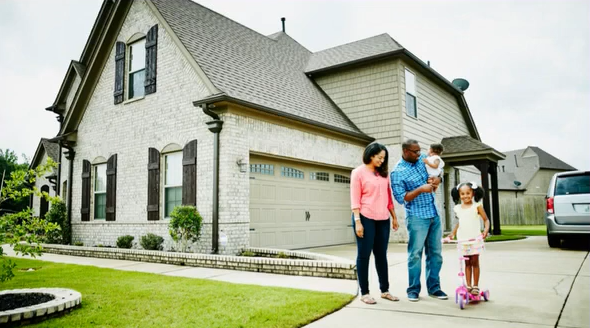| By NAREB Photos: NAREB\YouTube Screenshots ATLANTA – Black homebuyers are obstructed by systemic racism and economic factors like high interest rates and investor purchases. But speakers at the National Association of Real Estate Brokers (NAREB) Black Wealth Summit were enthusiastic about the progress, insisting that the journey towards homeownership and generational wealth is worth pursuing. The summit at Clark Atlanta University on November 15 was a platform for housing policy and lending, including forums on NAREB-commissioned studies. This year, sessions addressed the 2024 State of Housing in Black America (SHIBA) report and a study on appraisal bias and the impact of recent government and private sector efforts to curtail it. The homeownership rate among Black households was 45.7% in 2023, a sharp contrast to the 74.3% among White households and a significant drop from its peak of 49% in 2004. |

 “We are working really hard to make sure that we’re continuing to reduce barriers to credit and expand access to credit,” said Acting HUD Secretary Adrianne Todman, noting that the work done to “sustain generational wealth” will continue. “We have helped three million American families become first-time homebuyers. When you think about the context of what’s happening in our home ownership ecosystem, (then) you know that was hard fought.” Moreover, Todman asserted that HUD had sent Congress a strong report on the Federal Housing Administration fund. Acting HUD Secretary Adrianne Todman “We will be able to continue to help Black and brown folks become first-time homeowners for years to come because we worked on that fund to keep it healthy,” she said. “The other thing that I’m very sure of is the work that the career staff has done to make sure that our systems are built to help people who had previously experienced barriers. Whether that was their student debt or whether that was how we’re looking at underwriting and making sure we’re using things like on-time rental payments” towards determining qualification for mortgage loans. |
 Atlanta Mayor Andre Dickens said homeownership can be aspirational. “For people of my parents and their parents’ generation, becoming homeowners was a life-changing event for their family,” he said. “I can remember when we moved from apartments and into a house. My mother’s a single mother of two kids…when we moved into a house, everything stabilized. My whole life got so much better. And so homeownership matters and there’s an entire generation of those who grew up like my mother and even like me that says, ‘God ain’t making no more land on this earth, so we gotta ride now.’ And that was our cue to get it together and start our journey towards homeownership.” Jim Carr, author of the SHIBA report and appraisal bias study, maintained that some market forces work against Black homeownership. He noted that initiatives such as down payment assistance programs may not change the homebuying equation for Blacks. “If you put together a good down payment program, but there are no houses for you to buy, it won’t matter,” he said. “If the prices are so high and you compete against the vast investors, the down payment won’t help you because they don’t need an appraisal. They don’t need to have an inspection; they pay cash. So you’re not in the game. Even if you’ve got everything going for you in your neighborhood, you show up, and they charge you based on risk-based pricing; all of a sudden, you’re paying more than your white counterparts.” The racial wealth gap, said Carr, continues to grow because home prices increased even with high interest rates. “When you look to see the distribution of wealth, you’ll notice that Blacks have a higher share of their wealth in housing than do whites, but whites have substantially more equity in home ownership,” he said. “Now, people used to think that’s just because they have a higher homeownership rate. But one of the things we showed in our appraisal study is…white households are valued more than Black households even when the housing construction, the type, the size, and the neighborhood and its amenities are all the same.” |
 Dr. Courtney Johnson Rose, NARB’S President, cited how NAREB assists potential Black homeowners and helps Black families gain wealth. NAREB launched a Building Black Wealth Tour in the fall of 2023 to address the expanding Black-White Wealth gap in the U.S. The SHIBA report found that the Black-White wealth gap is so expansive across the United States that the 400 wealthiest Americans control the same wealth as all 48 million Blacks living in the country. Through workshops, interactive sessions, and one-on-one counseling at tour events in cities around the country, NAREB Black Wealth Tour attendees receive the knowledge needed to find pathways to buying homes and achieving family economic security. The tour has held events in more than 100 cities. “The Black Wealth Tour is a crucial initiative that is helping us overcome the barriers to homeownership,” said Dr. Rose. “We strategically engage with our communities, and our partners, including the Black church, Greeks, lawyers, and mayors, are all instrumental in this effort.” There are two million Black Americans eligible for mortgages and another 5.4 million close to that status. The tour provides families with tools, information, and confidence to apply for mortgages and become homeowners. The Building Black Wealth Tour empowers communities and individuals to achieve their homeownership goals. Dr. Rose also highlighted the NAREB Developers Academy, an initiative designed to increase Black participation in the real estate development industry. The academy provides aspiring Black professionals with the skills, knowledge, and opportunities they need to become successful housing and community development professionals. The initiative’s three key goals are to foster economic equity, increase Black homeownership rates, and revitalize underserved communities. Upon completion of the program, participants receive a certification certificate jointly from NAREB and the Urban Developers Council. NAREB is further partnering with the African American Mayors Association to identify high-priority cities that will be a focus for development activities. “We are teaching our members and scaling our members that are in development to help turn the blight in our communities into positive home ownership,” she said. |

| ABOUT THE NATIONAL ASSOCIATION OF REAL ESTATE BROKERS NAREB was formed in 1947 to secure equal housing opportunities regardless of race, creed, or color. NAREB has advocated for legislation and supported or instigated legal challenges that ensure fair housing, sustainable homeownership, and access to credit for Black Americans. Simultaneously, NAREB advocates for and promotes access to business opportunities for Black real estate professionals in each real estate discipline. From the past to the present, NAREB remains an association that is proud of its history, dedicated to its chosen struggle, and unrelenting in its pursuit of the REALTIST®’s mission/vision embedded goal, “Democracy in Housing.” |








